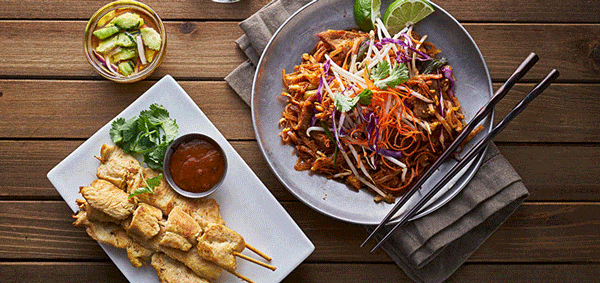5 Tips to Go Further with Food: Reduce Food Waste
When I worked in school nutrition, we always said about our student customers, “it’s not nutritious if they don’t eat it!” That goes for children AND adults. If we buy nutritious foods, but then we throw it away, we’ve lost the opportunity to be nourished by those foods. Reducing food waste is good for our bodies, our environment and our wallets. When I learned that the theme for National Nutrition Month was “Go Further with Food” with a focus on reducing waste, I immediately thought about the versatility and sustainability of peanuts.
Peanuts use a fraction of the water of other nuts and they are also incredibly useful – nothing goes to waste! Since the days of famed scientist George Washington Carver, we have been using the whole peanut—from the ‘meat’ inside to the skins to the pods—for eating, cooking, and making all manner of useful things. Talk about reducing waste!
But for me, a cook and food lover, the real magic of the peanut is its incredible versatility in my kitchen. In fact, that versatility helps me reduce my food waste across the board. Peanuts and peanut foods are one of my go-to tricks for reducing waste. Here are my top 5 waste-busting tips for you to incorporate into your efforts to go further with food:
Start at the store by buying ingredients that do multiple duty. Peanut butter is a great example because it can be used for sandwiches, spicy peanut sauces for noodles and stir-fry, Asian salad dressing, in hummus (instead of tahini), in baked goods and smoothies to add protein, and DIY granola. Many of these can also be made ahead and used over and over. A few of my other favorite foods that are super versatile include whole rolled oats (cereal, granola, baking), whole-grain bread (sandwiches, French toast, savory bread pudding), cheese (grilled cheese, sauce for macaroni, in eggs) and eggs.
Keep a running list of what you have on hand in the fridge, pantry and freezer. Incorporate these into your meal planning each week or make adjustments during the week to use those items up before they go bad. When I notice that I have too many apples, carrots, or bananas on hand, I either juice them right away or freeze them for smoothies later.
Do menu and meal plan and consult your schedule when you make your plan. If you know you’ll be traveling part of the week; that your kids have a ballgame one night and you’ll be munching on concessions; or that Friday night is date night, then you won’t want to plan meals for those evenings. Pro tip: Keep it simple if you’re stretched for time on weeknights – wait to channel your inner Martha when you have more time on the weekend.
Eat leftovers. This one is really for me – maybe you are a happy leftover eater. I hate to eat leftovers, but if I don’t eat them then I really throw away a lot of food. I work leftovers into my and my husband’s breakfasts and lunches, and we have a “leftover” meal at dinner once a week to clean out the refrigerator. It’s amazing what you can repurpose when mixed with eggs and cheese, or between two slices of bread, or topped with super yummy peanut sauce!
Use the whole fruit/vegetable, whenever possible. Save carrot, onion, celery scraps and herb stems for stock. Use the tops from radishes and beets in salads or sauté. Pickle chard stems. Bake potato peels to make crunchy snacks to feed hungry little ones while you make dinner.
I hope these ideas help inspire you to Go Further With Food!
Company Profile
Adhering to the principle of managing scientifically and honesty and credit,our factory has passed ISO9001-2000 quality system certification. Now, Our factory can provide potato dry cleaning machine, potato washing machine, potato peeling machine, potato sticks cutting machine, potato grader, potato chips production line, potato starch production line, potato mesh bag packing machine, potato dosing packing machine.
Our potato processing products have passed with CE,ISO and SGS Certificates and has been widely sold all over the world.


